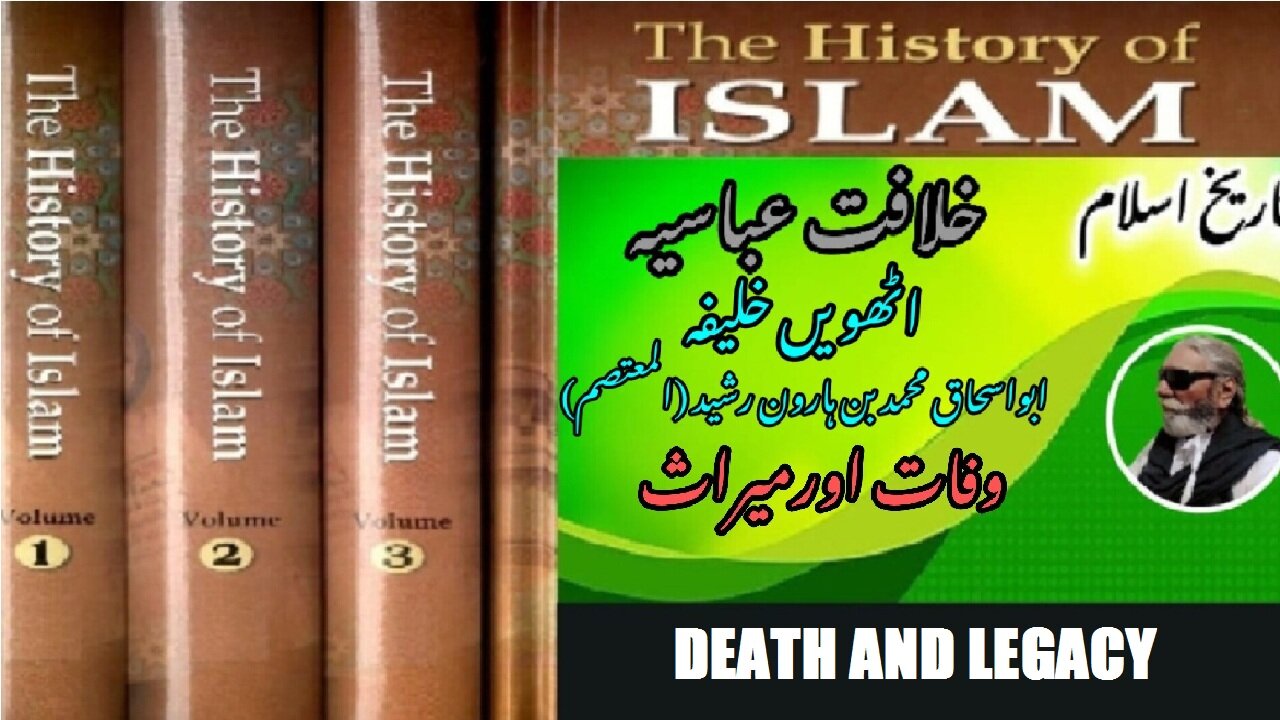Premium Only Content

Death and legacy of 8th Caliph of Abbasid Caliphate.
@islamichistory813, #abbasidcaliphatehistory, #caliphalmutasim #deathandlegacy #family #childerns
Death and legacy of 8th Caliph of Abbasid Caliphate.
Asslamoalaikum sisters brothers friends and elders, We are discribing the compelling history and lasting impact of the 8th Caliph of the Abbasid Caliphate in this educational and informative video. Delve into the significant events surrounding his death and explore his enduring legacy. Perfect for history enthusiasts and students, this video offers valuable knowledge that brings a pivotal era of the Islamic Golden Age to life. Don't miss out on this insightful journey through time! If you find this content informative, please share it with others who might be interested.
Death and legacy of 8th Caliph of Abbasid Caliphate.
Al-Tabari describes al-Mu'tasim as having a relatively easygoing nature, being kind, agreeable and charitable.According to C. E. Bosworth the sources reveal little about al-Mu'tasim's character, other than his lack of sophistication compared with his half-brother. Nevertheless, Bosworth concludes, he was a proficient military commander who secured the caliphate both politically and militarily.
Al-Mu'tasim's reign represents a watershed moment in the history of the Abbasid state, and had long-lasting repercussions in Islamic history.Al-Mu'tasim's military reforms marked "the moment when the Arabs lost control of the empire they created", according to Kennedy, while according to David Ayalon, the institution of military slavery introduced by al-Mu'tasim became "one of the most important and most enduring socio-political institutions that Islam has known".With his Turkish guard, al-Mu'tasim set a pattern that would be widely imitated: not only did the military acquire a predominant position in the state, but it also increasingly became the preserve of minority groups from the peoples living on the margins of the Islamic world. Thus it formed an exclusive ruling caste, separated from the Arab-Iranian mainstream of society by ethnic origin, language, and sometimes even religion. This dichotomy would become, according to Hugh Kennedy, a "distinctive feature" of many Islamic polities, and would reach its apogee in the Mamluk dynasties that ruled Egypt and Syria in the late Middle Ages.
More immediately, although al-Mu'tasim's new professional army proved militarily highly effective, it also posed a potential danger to the stability of the Abbasid regime, as the army's separation from mainstream society meant that the soldiers were entirely reliant on the ?a??? for survival. Consequently, any failure to provide their pay, or policies that threatened their position, were likely to cause a violent reaction. This became evident less than a generation later, during the "Anarchy at Samarra" (861–870), where the Turks played the main role. The need to cover military spending would henceforth be a fixture of caliphal government. This was at a time when government income began to decline rapidly—partly through the rise of autonomous dynasties in the provinces and partly through the decline in productivity of the lowlands of Iraq that had traditionally provided the bulk of tax revenue. Less than a century after al-Mu'tasim's death, this process would lead to the bankruptcy of the Abbasid government and the eclipse of the caliphs' political power with the rise of the Khazar officer Ibn Ra'iq to the position of am?r al-umar??.
Family
One of al-Mu'tasim's wives was Badhal. She had been formerly a concubine of his cousin Ja'far bin al-Hadi, his brothers al-Amin and al-Ma'mun and Ali bin Hisham. She hailed from Medina and was raised in Basra. Described as charming with fair skin, she was praised for her musical talent, particularly her skill in playing instruments, and was known for her exceptional ability as a songwriter and singer. One of his concubines was Qaratis, a Greek, and the mother of his eldest son, the future caliph al-Wathiq. She died on 16 August 842 in Kufa, and was buried in the palace of Abbasid prince, Dawud ibn Isa. Another concubine was Shuja. She was from Khwarazm, and was related to Musa ibn Bugha the Elder. She was the mother of the future caliph al-Mutawakkil. She died on 19 June 861 in al-Ja'fariyyah. Her grandson, caliph al-Muntasir offered the funeral prayer and she was buried in the Friday Mosque. Another concubine was Qurrat al-Ayn. A cultured and refined lady, she was a favourite of al-Mutasim.
Children
Abu Jafar Harun ibn Muhammad al-Mu'tasim, better known by his laqab al-Wathiq. He was the eldest son of al-Mutasim.
Abu al-Fadl Ja'far ibn Muhammad al-Mu'tasim, better known by his laqab al-Mutawakkil.
Muhammad ibn al-Mu'tasim.
Ahmad bin Muhammad al-Mu'tasim.
Al-Abbas bin Muhammad al-Mu'tasim.
Aisha bint Muhammad al-Mu'tasim, a poetess.
Allah Hafiz
-
 6:32
6:32
ISLAMIC HISTORY
2 hours agoBiography of Islamic Scholar Ahmad Baba al-Timbukti اسلامی اسکالر احمد بابا التمبکتی کی سوانح عمری
-
 LIVE
LIVE
ahdedazs
49 minutes agoBlack Ops 7 EARLY ACCESS BETA! *
79 watching -
 DVR
DVR
Simply Bitcoin
2 hours ago $0.22 earned$130B GIANT Makes HUGE $644k Bitcoin Prediction SOONER Than You Think | EP 1348
2732 -
 1:04:32
1:04:32
Timcast
2 hours agoTrump Preps INSURRECTION ACT, WINS In Court, Will Deploy National Guard To Chicago
129K67 -
 1:48:42
1:48:42
Steven Crowder
5 hours agoDid You Vote for This: Why The Podcast Bros are Turning on Trump
322K364 -
 1:08:40
1:08:40
The Rubin Report
3 hours agoListen to ‘The View’ Crowd Gasp as Whoopi Tells Super Bowl Crowd to Do This
44.1K65 -
 LIVE
LIVE
LFA TV
16 hours agoLIVE & BREAKING NEWS! | TUESDAY 10/7/25
2,827 watching -
 LIVE
LIVE
Rebel News
1 hour agoTamara Lich sentencing, Two years since Hamas attack, Carney meets Trump | Rebel Roundup
382 watching -
 DVR
DVR
TheAlecLaceShow
2 hours agoICE Under Siege in Chicago & Portland | Guests: Douglass Mackey & Wid Lyman | The Alec Lace Show
4.04K1 -
 1:39:08
1:39:08
The Mel K Show
2 hours agoMORNINGS WITH MEL K -Overwhelming Evidence of Grand Conspiracy Against We the People 10-7-25
17.9K8
